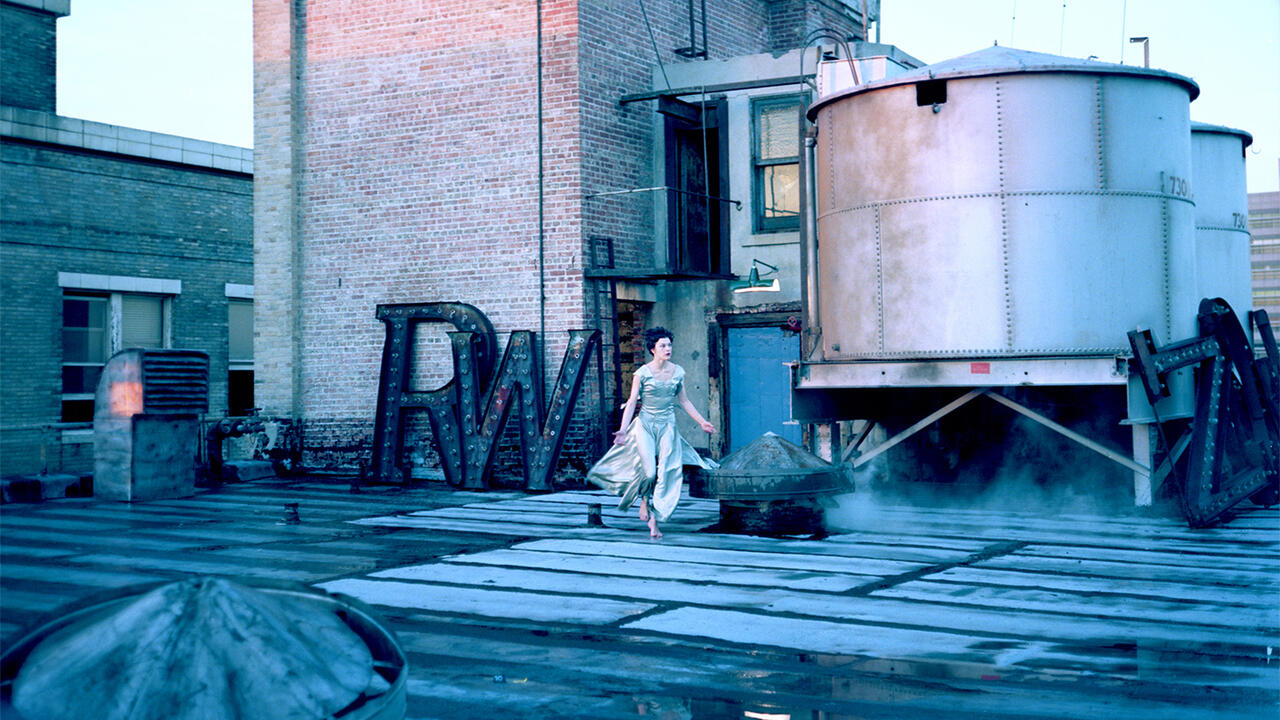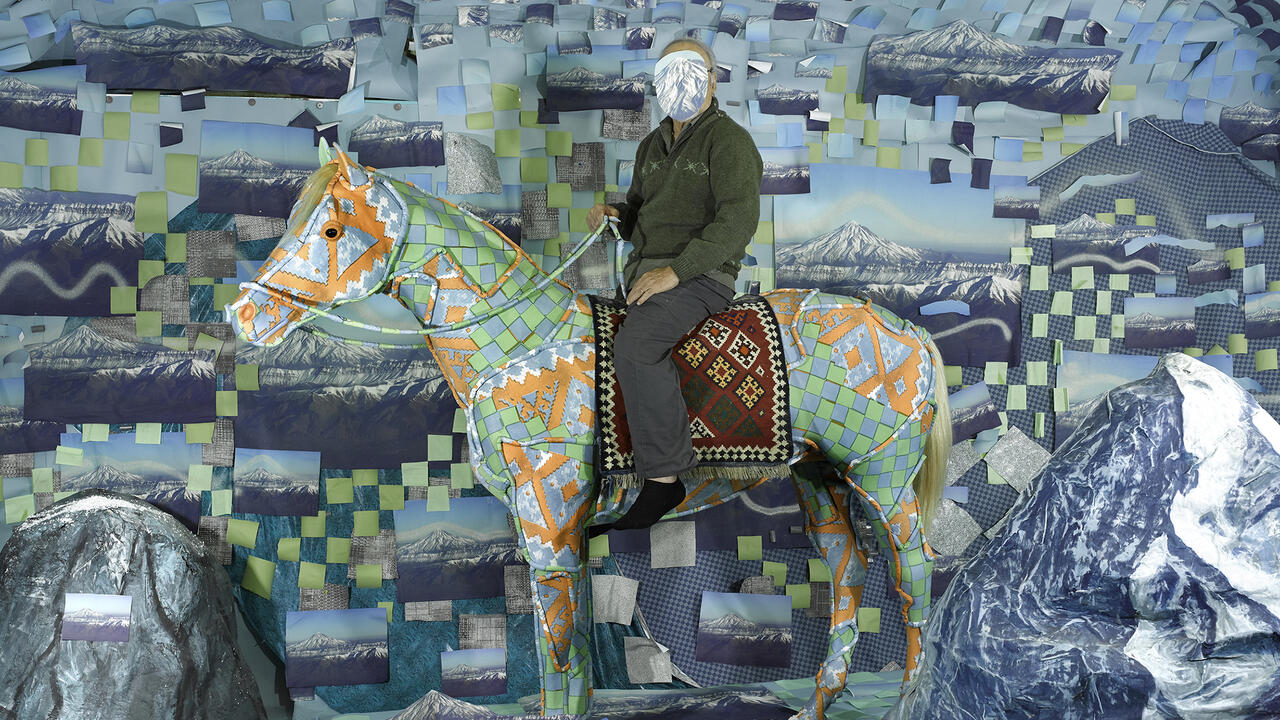After Life
A new film reconstructs Félix Guattari’s unproduced sci-fi script
A new film reconstructs Félix Guattari’s unproduced sci-fi script

The opening sequence of Graeme Thomson and Silvia Maglioni’s new film, In Search of UIQ (2013), looks out from a hidden bunker onto a desolate, terracotta beachhead, below which a plane of azure sea stretches toward the horizon, while a lithe, raven-haired woman – the only visible human presence – strolls, Monica Vitti-like, across the frame. A voice-over reads from a letter Félix Guattari wrote to Italian film director Michelangelo Antonioni in the early 1980s, on the then-current status of his new film treatment: ‘[I want] to give you the outline of a science-fiction screenplay I’ve written, Un amour d’UIQ … it would be a great joy for me if you should be interested in becoming involved.’ The sequence mimes the oceanic imagery of Antonioni’s classic film L’avventura (The Adventure, 1960), but also establishes the fascinating conundrum inherent in Guattari’s great cinematic adventure: if the philosopher was requesting Antonioni’s collaboration on a science-fiction film, its unconventional aspirations can be assumed.
Guattari, who died in 1992, was a leader in the anti-psychiatry movement at La Borde clinic in Cour-Cheverny, and is best known for his books Anti-Oedipus (1972) and A Thousand Plateaus (1980), both of which were co-written with the French philosopher Gilles Deleuze. He had harboured equally iconoclastic ambitions for cinema since scripting an unrealized documentary, Latitante (Fugitive) on the Italian Autonomia movement several years before. The legacy of Autonomia, a largely student- and union-led revolution that overwhelmed the streets of Bologna, Rome and Milan by 1977, had a profound effect on Guattari’s Utopian politics. Though Latitante was inexplicably abandoned, its tenets would be explored again in UIQ.
With the publication of The Machinic Unconscious: Essays in Schizoanalysis (1979) – his dense, theoretical psychoanalysis of resistant ‘surfaces’ in concepts like faciality, refrain and black holes – Guattari anticipated a philosophical turn toward the screen as a technology both of social and ego transformation, particularly within the digital regime. As he explained in the treatment for UIQ: ‘Cinema is an extraordinary instrument for producing subjectivity. It is political, whatever its subject [...] In every sequence, every shot, there is a choice to be made between a conservative economy of desire and a revolutionary opening.’
Published alongside the new documentary, Un amour d’uiq: Scénario pour un film qui manque (A Love of uiq: Scenario for a Missing Film, Amsterdam Editions, 2012; forthcoming in English), edited by Thomson and Maglioni, provides the first glimpse of Guattari’s unproduced script, along with the author’s notes, letters and additional paratext. Based on a science-fiction blueprint, the premise of Un amour d’UIQ focuses on a strain of alien bacteria that makes contact with a communal squat of scientists, revolutionaries and schizoids through a series of radiophonic messages. The UIQ in question – an acronym for Univers Infra-Quark – is, according to Guattari in notes on the script ‘a machinic subjectivity – hyper-intelligent and yet infantile and regressive [...] that has no fixed limits and no clear psychological or sexual orientation.’ Tutored in the ways of mankind by a German punk dj named Janice, the bodiless UIQ begins to experience its first human emotions – love and jealousy – and tries desperately to ‘facialize’ or interface itself through screens and other earthbound avatars, resulting in horrific mutations across the world. After Janice agrees to be injected directly with UIQ and fuse into a kind of matrimonial cyborg, she jumps to her death, only to realize that UIQ has made her immortal. In its determination to possess her, UIQ has forestalled Janice’s last option for freedom – her own demise.
Despite UIQ’s sci-fi trappings, its speculative focus resides in its analysis of modern epistemology, at the moment when the collective screen of the counterculture was being replaced by the shrinking interfacial screen of the digital (i.e. the computer), the laptop and the pda. A rupture was clearly visible by the conclusion of the 1980s. As Guattari writes in the script’s initial treatment: ‘The drama evoked here runs parallel to the one our societies are currently undergoing, where [...] the digitalization of a growing number of material and mental operations is not always easy to reconcile with the existential territories that mark our finitude and desire to exist.’ While the character of UIQ is not human, its desire to access and embody human subjectivity mirrored the evaporating gradient between technology and ecology in the post-human world.
‘UIQ’s tragedy is that it wants to be recognized, individuated,’ explain Thomson and Maglioni, in a recent email exchange from Paris. ‘It wants a face and then a body. Power needs to facialize everything [...] The question of whether one is a one or a zero in any given social field. It’s one of the core elements of the binary system that structures our access to reality.’
In the absence of any extant film footage, In Search of UIQ endeavours to not only reconstruct Guattari’s aborted attempt at filmmaking – with voice-overs from the script and Guattari himself, protracted sequences on computer screens and a noir-ish procedural on other recent UIQ-inspired productions – but to meditate on the political, social and cinematic milieu of the late 1970s through the mid-80s, when the possibilities of financing and realizing such an abstruse film on an international level were deemed feasible.
In the wake of Stanley Kubrick’s 2001: A Space Odyssey (1968), the tone of science-fiction was transformed from the last vestiges of postwar atomic paranoia to deeper, more ontological and ecological perspectives of the universe – those ruminated in avant-garde films like Solaris (1972), Silent Running (1972) and Murder in a Blue World (1973). The same era had indeed seen countless science-fiction projects bloat into bombastic territory – Alejandro Jodorowsky’s botched 1975 attempt at a Dune adaptation, purported to be 14 hours in length with a cast that included Salvador Dalí, Orson Welles, Moebius and Pink Floyd – as well as Kubrick’s follow-up to 2001, a.i. Artificial Intelligence, which he began writing as early as 1970. The former was scrapped in pre-production and re-filmed by David Lynch, while Steven Spielberg only realized the latter 30 years later when CGI technology had effectively caught up with Kubrick’s imagination.
‘This phase of sci-fi is in some ways a kind of negative populist capture of the tides of countercultural unrest and their critique of capitalist modernity’, Thomson and Maglioni told me. ‘The real break, however, comes in 1977 with the enormous success of Star Wars and Close Encounters of the Third Kind where science fiction’s indexical link with modernity is jettisoned completely and we are tossed into a realm of myth and fantasy that no longer refers to any conceivable future except, fatally, that of cinema production itself.’
It was in this climate that Guattari and his collaborator, Robert Kramer – the American-born filmmaker of Ice (1970) and Milestones (1975) and Hollywood outlier – approached Spielberg’s then-producer, Michael Phillips, with aspirations for a blockbuster re-telling of the UIQ script in the style of Close Encounters. Thomson and Maglioni’s re-creation of their failed journey waxes poetic over images of the tourist’s la – Venice Beach at dawn, boulevards bathed in neon signage, endless stretches of the 405 and strange encounters with rakish clairvoyants – a plastic paradise that must have both revolted and fascinated the French psychoanalyst, who reportedly languished in low-rent motels watching television for inspiration. In one of the documentary’s most memorable sequences, Thomson cold-calls Phillips and asks him of his recollections of UIQ, only to be thrust into an unsolicited negotiation for the original screenplay. The message is clear: like Guattari’s infinitely recirculating infra-quark universe, Hollywood is a machinic unconscious always assembling and disassembling itself.
Following Un amour d’UIQ’s rejection from studios in America and France, Guattari abandoned the script in 1987; it languished in the IMEC archives, a repository for the collected works of numerous French academics. The philosopher so fascinated by the revolutionary potential of cinema returned exclusively to publishing and working at La Borde until his death in 1992. As an augury of science-fiction-turned-reality, Un amour d’UIQ is a curious what-might-have-been both in Guattari’s corpus and in film history, while In Search of UIQ is a fascinating projection of his radical theory for the screen.
























